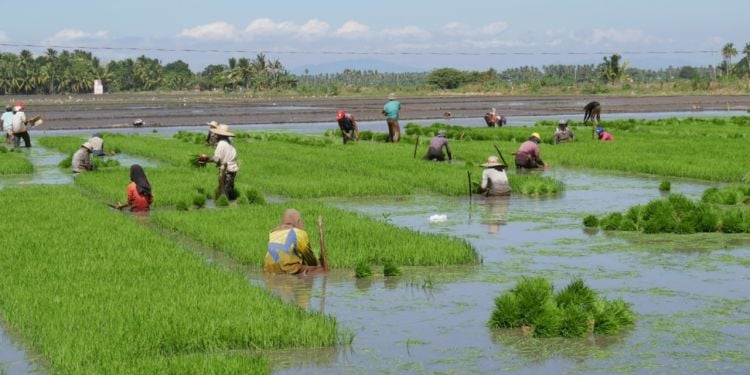Working in Davao

Located in Mindanao, Davao is a very dynamic city in economic terms, providing many professional opportunities for expats/ foreigners. Lying in the southeast corner of the Philippines, Davao City is the largest city in the Philippines by area and the second largest by population. It is in the Davao del Sur province and features hilly areas in the west, which slope into the southeastern shore. Among Davao's features is Mount Apo, which is the archipelago's highest peak, as well as the durian, a popular fruit in the country despite its strong and unpleasant aroma.
Davao City's population is over 1.95 million. Currently, over 2.37 million people are part of the total workforce population in the Davao Region. According to the Philippines Statistics Authority, Davao Region's total population of fifteen years old and over for January 2023 was estimated at 3.75 million. Davao City itself is divided into 182 villages called barangays.
It is estimated that only 4000 expats live in Davao, many of which are retirees. With this in mind, to secure a job in Davao, it is recommended that the applicant is well-prepared and has a game plan!
The labor market of Davao
Like most major Philippine cities, the Davao labor market is based mainly on agriculture, hunting and forestry.
In fact, the following products and activities make a significant contribution to the local economy: cereals (rice and corn), fruit crops (i.e., banana, durian, pineapple, and mango), rubber, industrial and commercial crops (i.e., coconut, coffee, and cacao), vegetables (i.e., eggplant, cabbage, and tomato), poultry, and fisheries. Wholesale and retail trade is its second major industry, followed by transportation and storage and construction.
A new and growing industry in Davao is Business Process Outsourcing, an industry that employs expats in management roles. BPO's are well known for their call centers, but they are also the delegation of IT-intensive business processes to an external provider that, in turn, owns, administers and manages the selected processes based on key indicators.
Including call centers, other BPOs in Davao are human resources management, accounting, payroll, customer service, marketing, and information technology. There are currently 57 BPOs in Davao, including Next BPO Solutions and Teleperformance.
Many expats have also found work in Davao in the following economic zones:
Agro-industrial
-
DADC Economic Zone
-
CIIF Agro-Industrial Park
-
AJMR Agro-Industrial Economic Zone
Manufacturing
First Oriental Business and Industrial Park
Information technology
-
The Annex-SM City Davao IT Center
-
Matina IT Park
-
Ayala Business Center
-
Felcris Centrale
-
Luisa Avenue Square IT Center
-
NCCC Davao IT Center
-
Abreeza Corporate Center
-
Robinsons Cybergate Davao
-
SM Lanang Premier IT Center
-
Damosa I.T. Park
Finding a job in Davao
You can find many job opportunities in Davao by browsing general and specialized job websites. Many of them are also advertised on professional social networks such as Linkedin or job sites such as Indeed, Monster or FoundIt. Make sure to update your resume and have your cover letter within reach while making them relevant to a Davao industry.
You can also browse the business directory on the Davao government website, where you can identify a few companies you can contact directly. Davao's official portal also has a special jobs corner.
When looking for a job in Davao, make sure that you have the skills and qualifications that are required locally. As a foreign professional, you must be able to provide skills that are needed in the area and not impinge on the local job-seeking pool. You should also be able to negotiate your wages with your employer according to your profile.
The work culture in Davao
In Davao, the locals primarily use Cebuano for everyday communication, and the different generations primarily use English in formal communication. However, a language shift was seen from the common use of Cebuano by the older generation to the use of Filipino/ Tagalog by the younger generation. Schools in Davao teach American English, and most of them use a standard neutral tone. Do remember to speak clearly and not use your own homegrown vernacular.
If you are lucky to secure a job in Davao, it is good to know that officially employees work for approximately eight hours a day, totaling 40 hours a week. Employees usually have two rest days, which are commonly Saturdays to Sundays. An additional 30% based on the employee's hourly rate is added for any extra working hours beyond eight hours. Make sure to read your contract carefully before signing and ask your company about anything that you do not understand.
Five paid leaves are also included per year once you have rendered a full year of service in the company. Davao, like the rest of the Philippines, has a total of eighteen national holidays each year, and any employee who works on a holiday is entitled to receive double the amount of their regular hourly rate.
Your working experience in Davao should be an enjoyable one. You may find your colleagues and staff to be a little shy at first. As Filipinos are naturally non-confrontational and passive as a nation, it is important to confirm everyone is on the same page regarding tasks and projects.
Before long, the over-familiarity of Davaonos will be the norm. Do not be shocked to be asked about your marital situation and likes and dislikes. Birthday parties are a huge occasion in Philippine workplaces, so be prepared for many celebrations with akes and music.
The professional dress code in Davao
‘Conservatively and modestly' are the two watchwords when thinking about how to dress for work in Davao. Most men wear short-sleeved shirts with or without a tie. Formal trousers are generally required, but shorts are not the norm. A jacket is good to have on standby for more important occasions. For female expats working in Davao, you are advised to avoid clothing that may be seen as provocative. Appropriate attire includes dresses or pants covering your knees, shoulders, and chest.
Wages in Davao
The average wage in Davao is P390,012/ USD 7,024 per year or an hourly rate of p188/ USD 3.39. Although the cost of living is relatively low in Davao, for an expat to earn a salary like in Western countries, then a senior management role is the only way to go. Still, the cost of living and rent are 80% cheaper than in New York. However, grocery, restaurant and fuel prices have been on the rise.
The interview process in Davao
Applying for a job in Davao requires a professional and updated CV and a cover letter. Applications are made through the relevant company or a recruitment agency.
The CV should include a 2'x2' photo on the top left-hand side, use an international tone rather than local vernacular, and include references and projects that have been completed. Let your CV speak to the desired audience.
The cover letter should be formal and show that you have knowledge about the company and industry in question. Be professional!
If called for an interview in Davao, you are advised to dress smart and be on time. Ask the right questions and answer the interviewer's questions using strong communication skills.
Visa requirements for working in Davao
Work visa
The most common type of work visa for expats issued in the Philippines is the 9 (G) visa, also known as the Pre-arranged Employment Visa. It allows employers in Davao and the Philippines to employ expats with skills, qualifications, and experience that may be in short supply. Refer to our article about “Visas for the Philippines” for more information. Also, keep in mind that it is strictly forbidden to work in Davao with a tourist visa only.
Good to know:
If there is a skilled Filipino who can do the particular job in question, then they will be prioritized for the job.
Work permit
Foreigners/expats who plan to work in Davao are required to obtain a work permit. There are three main work permits in the Philippines, and they can be obtained from two agencies — the Department of Labor and Employment and the Bureau of Immigration.
When applying for an alien work permit in the Philippines, the following documents must be submitted to your local DOLE office:
-
Completed application form
-
Employment contract
-
Employees passport with a valid visa
-
Employer's Business Permit
If you are expected to work for less than 6 months in Davao, a Special Work Permit should be acquired. If the job will be lasting for more than 6 months in Davao, then an Alien Employment Permit (AEP) should be obtained.
Since Davao is smaller than Manila, there are fewer job opportunities there. However, with the right skills, the right approach to applying for the position, the correct visa and patience, it is possible to secure lawful employment in the city. Good luck!
Useful links:









